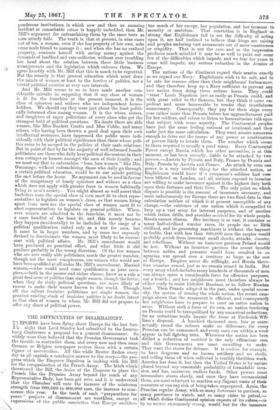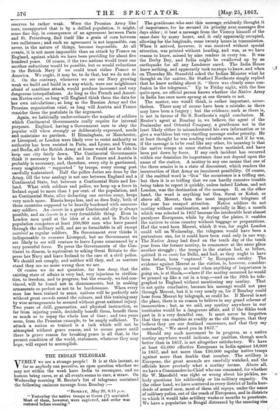THE DIFFICULTIES OF DISARMAMENT.
1"), EPORTS have been flying about Europe for the last fort- it) night that Lord Stanley had submitted to the Luxem- burg Conference a proposal for a general disarmament. So widely were they believed that the Prussian Government took the trouble to contradict them, and every now and then some German or Belgian newspaper revives them with a certain vigour of asseveration. All this while Reuter flashes every day to all capitals a conclusive answer to the story,—the pro- gress which the Emperor Napoleon is making with his Bill for the reorganization of the French Army. The hitch which threatened the Bill, the desire of the Emperor to place the French like the Prussian Army beyond the reach of any Representative Body, has been got over, and it is understood that the Chamber will vote the increase of the minimum strength from 600,000 to 800,000 men, the increase to com- mence this year. In the teeth of such "preparations for peace projects of disarmament are worthless, except as
too much of her energy, her population, and her-treasure- tb security or ambition. That conviction is in England-so strong that Englishmen fail to see the difficulty of acting upon it, are half inclined to believe that kings are raising and peoples enduring vast armaments out ofmere- wantonness or stupidity. That is not the case, and as the impression produces much mischief it may be as well to point out some few of the difficulties which impede, and we fear for years to come will impede, any serious reductioir in the Armies of Europe.
The nations of the Continent regard their-armies exactly as we regard our Navy.- Englishmen wish to be safe, and to be safe for reasons other than their neighbours' forbearance, and they therefore keep up a Navy sufficient to prevent any two navies from doing them serious harm. They could " trust " Louis Napoleon just as easily as Prussia could; and with great relief to the finances, but they think it more -11IF pedient and more honourable to render that trustfulness unnecessary. Consequently, they pay for their ships every year rather more than Prussia before her aggrandizement paid for her soldiers, and refuse to listen-to humanitarian talk upon that subject with some asperity. The Continental peoples have just the same feeling, rational or irrational, and they make just the same calculation. They want armies numerous enough to drive out the troops of any power or combination of powers likely to invade them. The number which seems to them required is usually a good many. Every Continental Power except Russia, which has other necessities, is at this moment, or has been recently, liable to be attacked by two powers,—Austria by Prussia and Italy, France by Prussia and Italy, Prussia by Austria and France. An attack by even one power is a very terrible thing for the attacked nation; as Englishmen would know if a conqueror's soldiers had • ever been billeted on London, and all nations exposed to invasion are willing to make insurance against it the highest duty both upon their fortunes and their lives. The only point on which dispute is possible is the amount of insurance necessary, and most unfortunately for Europe there are two fixed data in that calculation neither of which is at present susceptible of any change,—the existence of one nation which is compelled to keep up a vast army for internal purposes, and of another which trains, chills, and provides materiel for its whole peoplet Russia.cannot disarm. Her territory is so vast, it -contains so many half-civilized warrior races, its people are so Mai civilized, and its governing machinery is without the bayonet so feeble, that with less than- 600,000 men the empire would probably perish from incessant small shocks, attacks, emeutes; and rebellions. Without an immense garrison Poland would be lost. Without an immense garrison the recent trouble between nobles and peasants would have resulted in an agrarian war spread over a territory as large as the rest of Europe. Empires never die willingly, and Russia there- fore remains armed, just as we remain armed in India. Hat every army which includes many hundreds of thousands of men can always spare a considerable force for offensive purposes; say a fourth ; and her neighbours must therefore always be either ready to resist 150,000 Russians, or to follow- Russian lead. Then Prussia adopted in the past, under special necess sity, the system of arming the whole nation, the recent cams paign shows that the armament is efficient, and consequently her neighbours have to prepare to meet an entire nation in arms. Without such a force of its own, no nation bordering on Prussia could be tranquillized by any numerical reductions; for no reductions really impair the force at Frederick -W111 ham's disposal. A hundred thousand men, less or more; actually round the colours make no difference, for every Prussian can be summoned, and every man can within a-week appear in full fighting trim. Wherever the nation has been drilled a reduction of materiel is the only efficacious one and this Governments are most unwilling to make:
They want the stores for defence. It is useless, for example, to have dragoons and no horses; artilleur and no shells, and selling them off when collected is terribly thriftless works America has done it, but then the United States is by nature placed beyond any reasonable probability of formidable inva- sion, and has, moreover, endless funds. Other powers must accumulate stores slowly, and once they have accumulated them, are most reluctant to sanction any flagrant waste of their resources or run any risk of being taken unprepared. Again, the
Prussian regular Army, with so many fortresses to garrison, so many provinces to watch, and so many cities to patrol,— all which duties Continental opinion--expects of its rulere;--is by no means enormously strong, would but for the immense reserves be rather weak. Were the Prussian Army like ours, unsupported that is by a drilled population, it might, some fine day, in consequence of an agreement between Paris and St. Petersburg, find itself like a grain of corn between two millstones ; and such an agreement is not impossible, can never, in the nature of things, become impossible. At all events, it is not more impossible than an attack by France on England, against which we have been providing for about five hundred years. Of course, if the two nations would trust one another reductions would be possible, but so would reductions in the British Navy if we could trust either France or America. We ought, it may be, to do that, but we do not do it. " On the contrary, whenever we see our Navy growing weak we build and build in a way which, were our neighbours afraid of maritime attack, would produce incessant and very dangerous interpellations. As long as the French and Ameri- can Navies exist, so long will England think them the data for her own calculations ; as long as the Russian Army and the Prussian organization exist, so long will Austria and France consider them the postulate in the argument.
Again, we habitually under-estimate the number of soldiers which Continental Governments really require for internal purposes. England, having a Government sure to obey the popular will when strongly or deliberately expressed, needs and maintains no garrison. If Birmingham, or Manchester, or Liverpool, or London were likely ever to resist authority as authority has been resisted in Paris, and Lyons, and Vienna, and Berlin, all the British Army at home would not be able. to keep one city fairly down. The Continental Governments think it necessary to be able, and in France and Austria it probably is necessary, and, therefore, every city is garrisoned, every magistrate " supported " by troops, every strong post carefully maintained. Half the police duties are done by the Army, till the true analogy is not one between England and a Continental State, but between a Continental State and Ire- land. What with soldiers and police, we keep up a force in Ireland equal to more than 1 per cent. of the population, and no Continental State, after deducting one service army, keeps very much more. Russia keeps less, and so does Italy, both of them countries supposed to be heavily burdened with unneces- sary soldiers. An &mite in a great Continental city is always possible, and an &mite is a very formidable thing. Even in London men quail at the idea of a riot, and in Paris the population comprises at least 200,000 men who have passed through the military mill, and are as formidable in all except niatitie/ as regular soldiers. No Government ever thinks it indispensable to overawe Liverpool, but no Government we are likely to see will venture to leave Lyons unmenaced by a very powerful force. To press the Governments of the Con- tinent to disarm, is equivalent to asking Great Britain to dis- perse her Navy and leave Ireland to the care of a civil police. We should not comply, and neither will they, and as matters stand they are no more wrong than we are.
Of course we do not question, far less deny, that the existing state of affairs is very bad, very injurious to civiliza- tion, to freedom, and to progress, but the remedy, we feel con- vinced, will be found not in disarmaments, but in making armaments so perfect as not to be burdensome. When every man has been trained to arms, nations will be perfectly safe without great crowds round the colours, and this training may by wise arrangements be secured without great national injury. Two years of drill, gymnastics, and physical instruction, so far from injuring youth, decidedly benefit them, benefit them so much as to repay the whole loss of time ; and two years seem, from the Prussian example, to be amply sufficient. To attack a nation so trained is a task which will not be attempted without grave reason, and to secure peace until there is grave reason for breaking peace is all that, in the present condition of the world, statesmen, whatever they may hope, will expect to accomplish.































 Previous page
Previous page